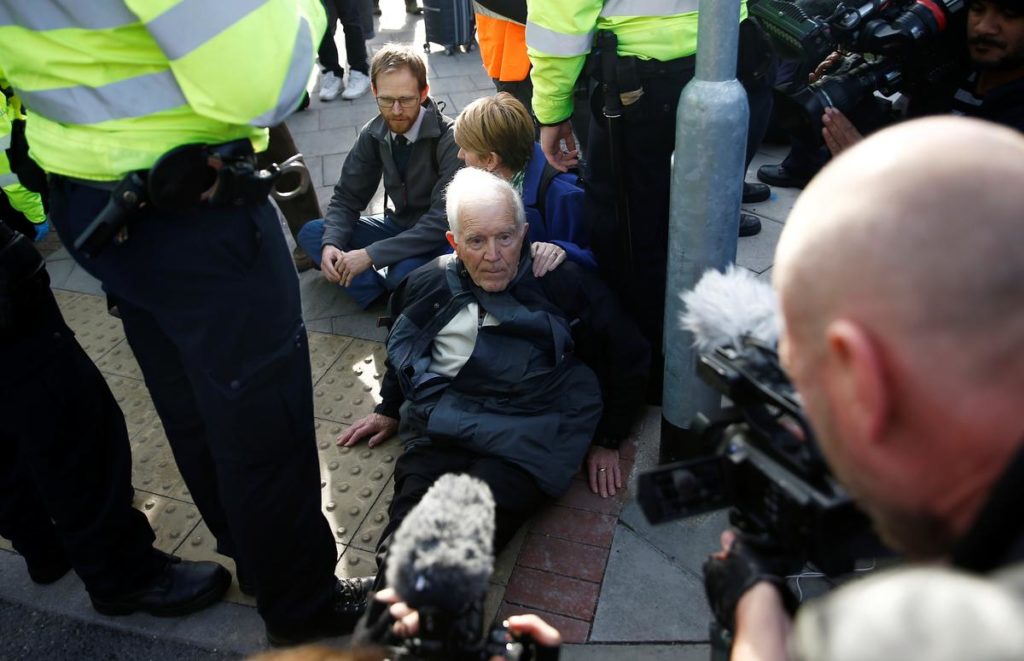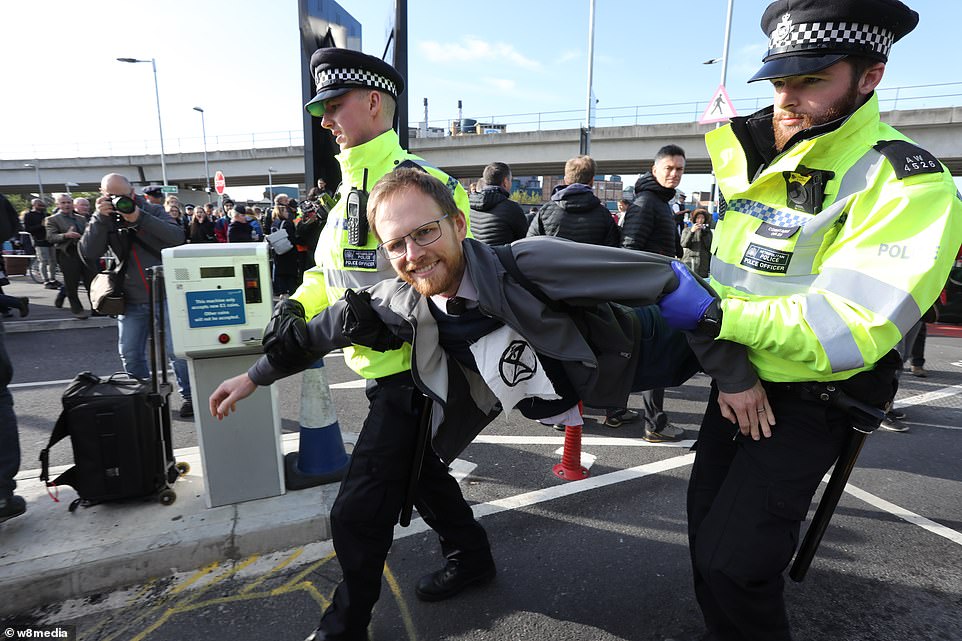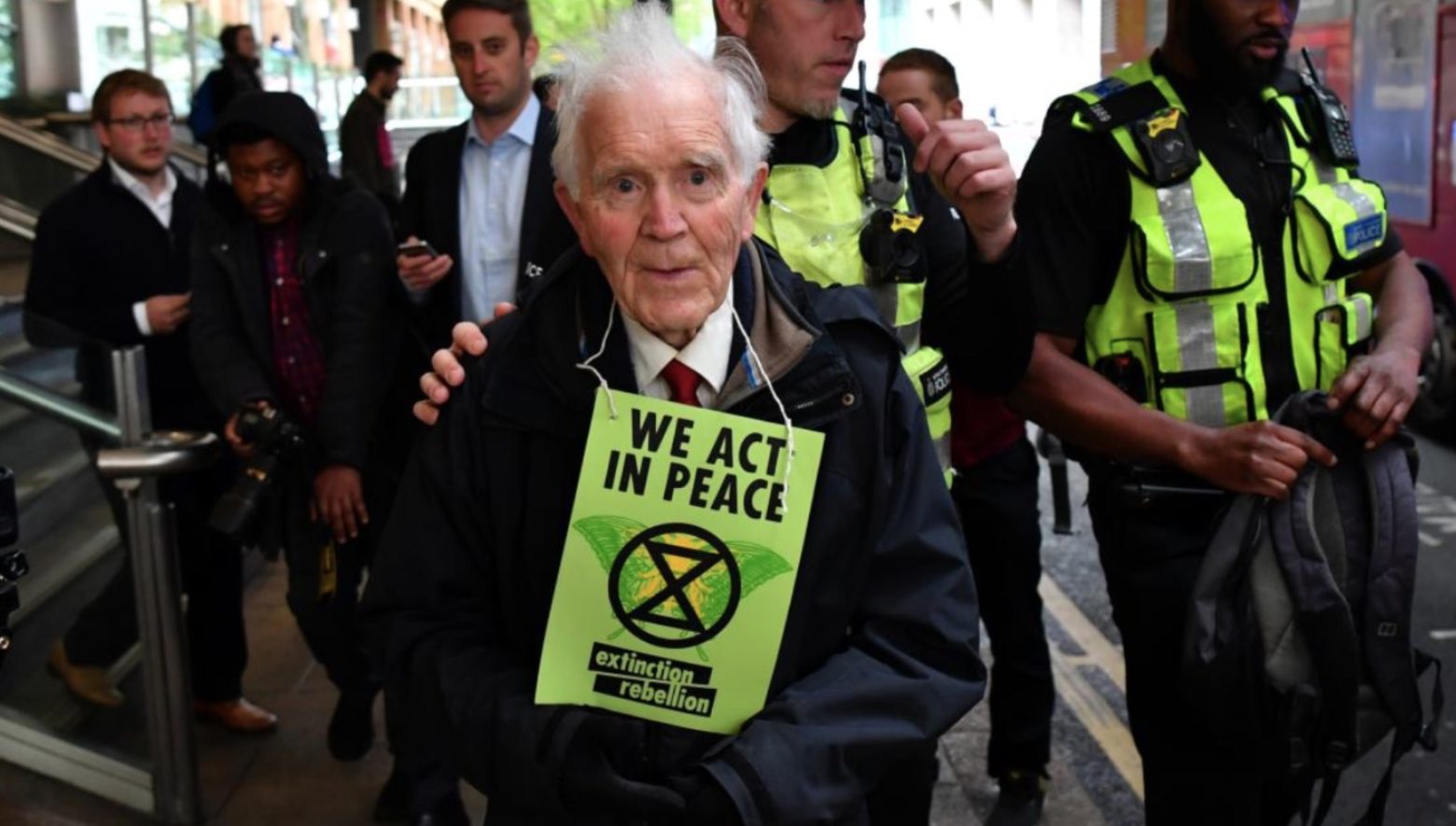I preached for the first time at our church in Sheffield. Thinking about how our faith in a God of love, life and recreation might mean we need to start to break some rules.
I don’t feel like much of an environmentalist. I was brought up surrounded by Save the Children posters, Christian Aid collections and “Make poverty history” (remember that?). I felt like ‘the environment’ was a side issue; something other people were into, but not that important. But over the years, it’s become clearer to me that they’re both part of the same thing. The poorest in our world often rely most directly on the land to survive, and we are realising more how much all our lives are dependent on the natural world. Living fairly and peacefully together as people, and defending and restoring the environment are like two wings of a bird. Our faith can’t fly without both being healthy.
So although we’re looking at the 5th mark of mission – treasure creation – you’ll see that it is at least as much part of the 4th – transforming unjust structures of society and challenging violence.
In our hands
This is something tangible and ever-present, as close as our own bodies.
So I invite you to hold both your hands in front of you. Hold one hand as a tight fist, and the other as an open palm.
Think about this contrast. What feelings do they each represent – the fist, and the palm?
For me the fist is: fear, anger, violence, keeping hold of our stuff or our power; versus the palm showing welcome, generosity, connection, vulnerability.
These things will return as we look through themes from the verses we’ve read.
What does God say about creation?
From Isaiah 11:1-12:
“but with righteousness he will judge the needy,
with justice he will give decisions for the poor of the earth.”
…
“They will neither harm nor destroy
on all my holy mountain,
for the earth will be filled with the knowledge of the Lord
as the waters cover the sea.”
Isaiah paints a picture for us of a leader who is filled with Godly wisdom and delivers justice for the poor and vulnerable. And a community of creatures who no longer fear one another but find they can live in peace together. There is no violence or destruction.
Part of this is clearly referring to Jesus as a new leader for God’s people. But we don’t see much of this vision of renewed creation around us. Do we sit tight and wait to die, get to some kind of Heaven, and find it there?
I don’t think so.
God’s direction of travel is not about escape – taking our souls ‘home’, away from this mess. Jesus shows God coming towards us, embracing and transforming his creatures. Bringing glimpses of a renewed creation into being here and now. He taught us to pray: “Your will be done on earth as it is in heaven.”
From Romans 8:18-25:
“that the creation itself will be set free from its bondage to corruption and obtain the freedom of the glory of the children of God. For we know that the whole creation has been groaning together in the pains of childbirth until now.”
In Romans 8, Paul has been going through detailed theology of salvation, and drops in this bit about creation. It could seem a distraction, but Bishop N. T. Wright describes it (in his helpful book Surprised by Hope) as Paul walking us up a long path through deep woods, and coming to a viewpoint in a clearing – we can suddenly get a true perspective on where we’d been coming to all along. God redeeming creation is all part of God’s way of redeeming us, his children. And it seems to be that creation needs us – God’s children – to be renewed for it to be renewed.
But Paul also speaks of creation groaning as in childbirth. That’s some profound groaning.
We barely need reminding that creation is in trouble; our climate is in trouble. We hear about the heat records, the disappearing arctic ice, the hurricanes, the increasing droughts and famines.
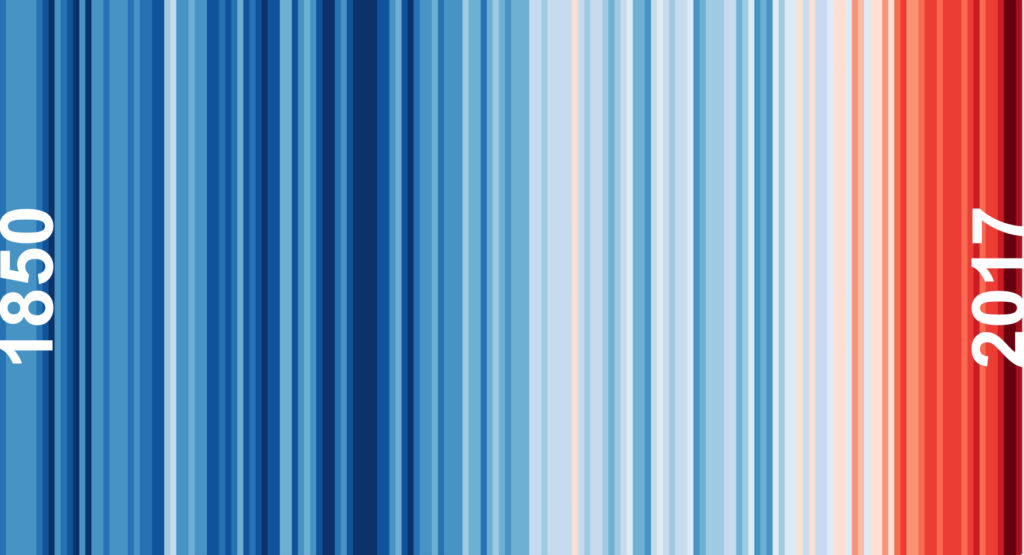
Isaiah writes about this good leader looking beyond what is seen and heard, to judge with justice for the poor of the Earth. For us to follow that example must mean understanding the wider impacts of these events. Isolated events on the news are hard to see as a pattern.
UN rights chief, Michelle Bachelet says of climate change: “The world has never seen a threat to human rights of this scope… Intensifying competition for scarce resources fuels violence and political instability … and the rights of people in every country, and future generations, will be impacted.”
David Attenborough says: “If we have not taken dramatic action within the next decade we face irreversible damage to the natural world and the collapse of our societies.”
This is hard to comprehend. But it means fear, scarcity, violence and conflict. Forced by conditions which, if left unchecked, will continue to get worse indefinitely. My understanding is this means that within my children’s lifetime, billions of people could lose their lives.
Dietrich Bonhoeffer wrote:
“The ultimate test of a moral society is the kind of world that it leaves to its children.”
How can we respond to this?
How does this make you feel? Which hand does it feel like – a fist or a palm? For me it’s a fist. Fear. Anger, at how we’ve been brought to this point, by people in power over years. Men making decisions with the knowledge that this is happening, but choosing to ignore the consequences. I find myself wishing I were able to control things, but feeling powerless.
I’ve known climate change is a serious thing for years. Like many of us, I’ve tried to do what I can, hoping that would help. But somehow, in the last year, the sadness and fear of it has come home. I’ve felt broken, hollow. I’ve found myself crying uncontrollably, privately and in public. Holding my sleeping baby, I’d wrap my arms tight around him, and try to promise him and his sister I would do whatever I could to protect them. Even though I know that can never be enough.
The darkness of what we are now heading into can seem overwhelming. But also it’s somehow brought me back to a living faith which I felt was almost totally dried out. I was still coming to church. But I was a shell.
Now I find I’m longing to know the God of David in Psalm 23: “Even though I walk through the valley of the shadow of death I will fear no evil, for you are with me.”
We can have faith in a God who is bigger than death, who has defeated death. And walks with us, even within the shadows, this side of his new creation coming fully and death being no more. But does knowing this God mean we don’t worry so much about trying to make things change?
For me it feels the opposite.
It feels like when God walks with us He can open our fists, he can prise our fingers open. His perfect love can cast out all fear.
He can offer us His hand like someone helping a small child who is learning to walk. And when they have a hand to hold on to, that child can take steps that they couldn’t take before. Sometimes they can take wildly courageous steps that they have no right to think would be stable or possible.
And so, if we’re holding on to God with that hand that he offers us – do we say “is it too late to solve this great problem, can anything still be done?”
Yes, I believe it can.
I can’t promise it will all work out, because this is enormous. The damage already done is huge, and the suffering still to come, even in the best case, is unthinkable.
But I think the promise that we have from God is that he doesn’t leave us. He doesn’t expect us to fix it on our own. But that when we ask for his help, he turns around and gives us his power to do it with him.
What needs to change?
So we see that what does need to be done is a radical reduction of greenhouse gas emissions within the next few years. And if that could happen then our power, our little thing that we find ourselves in at this point in history, could perhaps save the suffering and death of enormous numbers of people. In this generation, and in our children and grandchildren’s and further on and on.
We are at a point in history where those of us alive now could do some of the most good that has ever been done.
And creation itself, when we go beyond doing damage and stopping the damage, we find that it can restore. Deserts and even grazing land – which to the environment is a lot like a desert – can return to being forest. They can draw carbon out of the air. The complex web of life can start to find its way back.
But to do these kind of radical reductions in carbon emissions we need government to organise things, to help. Our little pieces, our efforts, are all good things in themselves, but they aren’t adding up. We have to honest that we are not reducing the global emission curve – it’s still going up. And we need our government to have such a change of heart.
What would happen if we started pursuing the economy for its own sake perhaps, for money – but we looked instead to the wisdom of John Ruskin’s, saying:
“There is no wealth but life”.
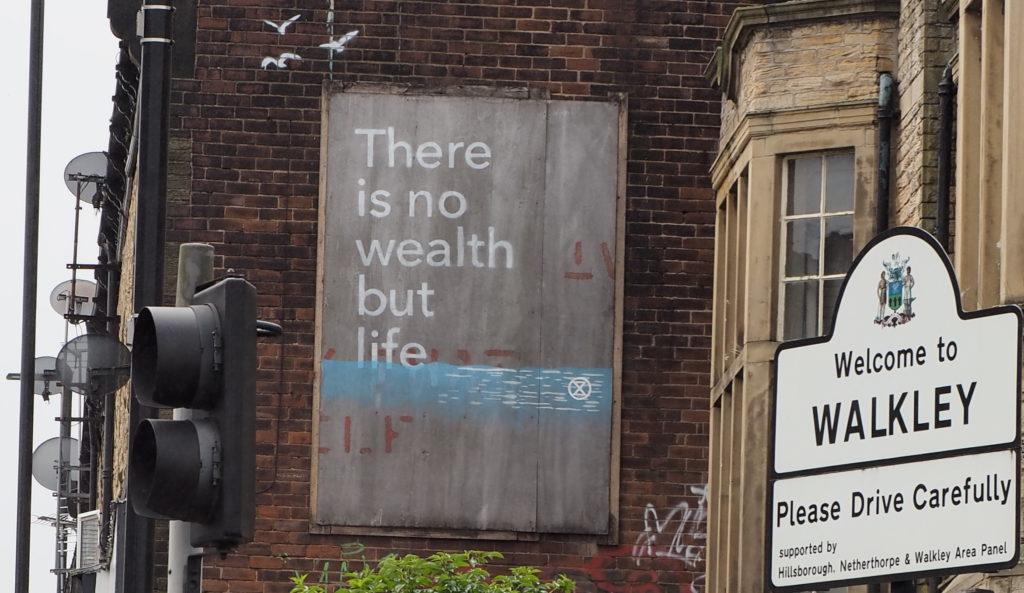
What would that mean? For a government to reorganise, urgently. Within our time, within these next few years… to say we’re not going to worry about growing money. We’re going to worry about protecting life.
We need a transformation the scale of a world war. Because during wartime, the usual limits on what’s possible, affordable, or worth the inconvenience, are laid aside. The interests of all the people can be put before the interests only of the wealthy.
We instead focus on what is necessary.
Now, it could be that if we make this transformation, there would be a new fairness in our societies. Fair laws would be limiting the consumption – and over-consumption – of the richest, which is where most of the problem comes from.
We are not all equally responsible for this.
Doing that would make all of our lives healthier, safer, less stressed, even more connected to each other.
I think there would probably be a lot of bicycles involved.
We’d need to find ways to change the measures of our success, from making money to restoring life. And I think that gives us something to look forward to. This isn’t all just “how many hair shirts can we put on?”.
And yet where we find ourselves today is facing a system, a government, an economy perhaps led by people still feeling like the fist we felt earlier. That we just have to keep holding on to what we have, and we’re scared of change.
And so, we build bigger airports
Which is complete madness.
We pass laws to maximise our oil extraction. We keep doing the same things that are causing the problem. And sadly all of our efforts even to influence our politics – writing letters, meeting MPs – aren’t working.
So, do we just allow this to go on? Allow our leaders and the wealthiest in society to destroy the creation we rely on for life in a polite, uninterrupted decent into hell?
Or do we look to our Bible? To our history of people following God? Do they just go along when things are not right? Or do they begin to rebel? In some cases following God rather than man.
We’ve heard of the Egyptian midwives who refused the orders of Pharoah to kill the Hebrew baby boys, and in doing so saved Moses. We’ve heard of Shadrach, Meshach and Abednego, and Daniel, disobeying their different kings to follow God’s way. We’ve heard of Jesus defiantly healing on the sabbath, going against the rules that were set up by men, in order to bring life and follow God.
And Jesus continued challenging and rebelling against the authorities of his day, even knowing that they would try to stop him, by death.
And he would rebel against that too.
He refused to stay dead.
But in his resurrection God reveals the power for creation, and for us all, to be redeemed, to be renewed.
And although we still find darkness around us, we see other people following Him and finding that power. Rebelling for life against the way things are and the rulers over them. Corrie Ten Boom, Dietrich Bonhoeffer, Martin Luther King, Desmond Tutu.
We can put like this: sometimes divine obedience, to God, can mean civil disobedience to our authorities.
Christians are still doing this, and in our time we are seeing this in the work of Extinction Rebellion. We have had the privilege as a family of starting to get involved.
In April we spent some time in London while there were 1100 nonviolent people being arrested by authorities who find the fist of control and fear to be their only tool. They can only say that they want to keep hold of their power.
But what this movement says – following many others using nonviolent civil disobedience, like Martin Luther King – they say: we can choose to act like the open hand. We can use our fragile bodies and our discipline. Our peace and our patience and our goodness and kindness and self control to overcome the power of that fist in some mysterious way.
It hasn’t all worked yet of course.
And so it continues happening.
One of the people who has most inspired me in this is a Christian who is 83, called Phil Kingston. He was arrested for disrupting a DLR train to the City of London financial district in April.
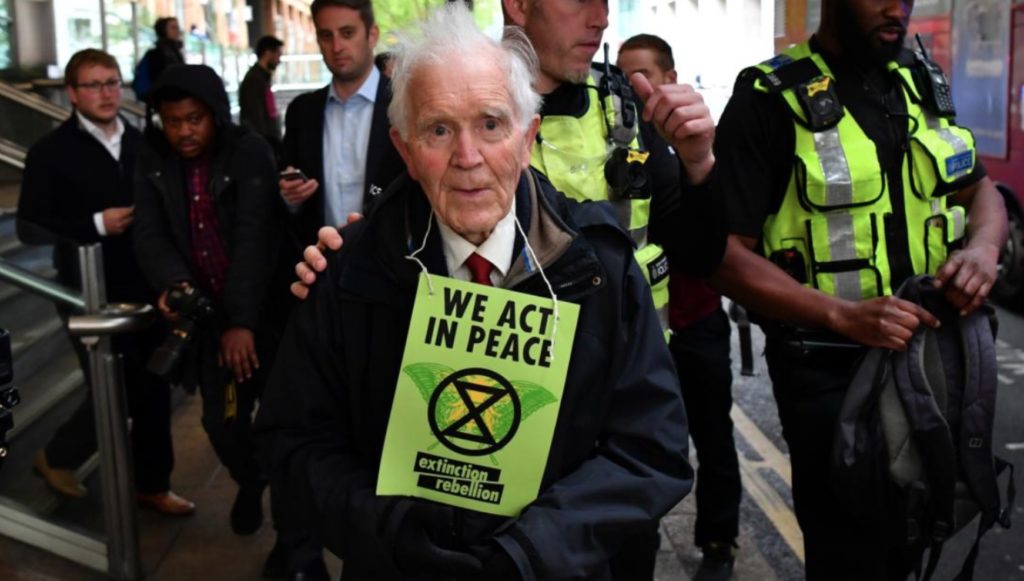
I first saw him taking action with other grandparents a year ago. They were locking themselves together in the entrance to the government department for energy, saying they were not happy with what their government was doing to the prospects of their grandchildren.
Seeing the image of his face, simply sat there – determined but sad – cut through to me. The grief of what we face became a little more real. And it made me feel like I could get a courage from him. He feels those things, but it doesn’t make him stop, it makes him start doing something about it.
He says “they [the government] have the power, but we have something much more important. We have the authority based on love and truth.”
That may all sound very out there. Something other people do perhaps?
What about what we can do?
What about us here at St Tim’s?
One thing, possibly the first thing we should always do, is prayer. Listening and hearing God’s heart for his world, for his people, for us. Learning and understanding together the scale of this problem, this crisis; and what kinds of things might have to change in order to have a chance at renewing life in this situation. Extinction Rebellion’s first demand is to “Tell the Truth”. Until we recognise and admit what the problem is we won’t be able to start to act appropriately.
As a church we can find all of our different roles. Of course we are a body with many parts. We’re not all going to be on the front line in that way. But we all have different gifts.
We might find that our ways of creating, writing, art, performing or teaching – maybe building, serving, fixing, welcoming people in… all of those things can find some part in this. A part that only we can do. None of us can fulfil each other’s gifts. There’s something that we can do, each of us, that can’t be done if we don’t do it. And it might feel small and insignificant. We might feel like it’s not going to make a difference.
But God says “My grace is sufficient for you, and my power is made perfect in your weakness”.
It’s in offering our weakness to God and saying: we’re here, we’re broken, but we’re open. And we want to do this. We want to come together to do what we need to do to protect life. That He will take us and make something out of it.
We can share ideas with each other. Sometimes they may be unthinkable ideas – we need to get better at that.
My one that I’m going to start with is that we have this beautiful church building. But it takes an awful lot of energy to heat when it’s cold. And we also have a nice, modern hall across the way which doesn’t. And I think probably we can all fit in. What if, in the winter months, we had our main services there? We’d save an enormous amount of fossil fuel, and money, and maybe come here for special occasions – for Christmas, and Remembrance?
If you do want to join in with some of those actions that I’ve been sharing about, Extinction Rebellion is something more and more Christians are joining in with. There’s a group across churches in Sheffield which is starting to find people who want to come together to join in. To plan our own things – no one tells you what to do in this. You decide for yourselves, you come together and you act together.
As part of the next big XR action in London, Christians are helping organise a Faith Bridge. Blockaded to traffic and causing some disruption – which is the reason everyone the authorities pay attention – and filled with prayer. Filled with worship. Filled with any of us who want to take part.
In our hands
To finish I invite us again to look at your hands. When you come to God you can be honest. It’s okay to feel like the fist, to feel this fear, anger, wanting to hold on. God meets us wherever we are. And you can ask him to take your feelings, to take your gifts and the little things you are able to offer, and to draw you to Himself, and into his new creation of love, of peace, and an open hand.
As we take our communion, we take the bread into a palm. It’s the only way it works. And every time you do that you’re reminded and invited to take another step out of fear and into into His resurrection.
Into freedom for ourselves, that can bring a freedom for creation.
Update: October 2019
A month after sharing this sermon, I did what I could to put my words into action. I was arrested alongside Phil while holding a prayer vigil at London City Airport. Our Government is investing hundreds of millions of pounds in almost doubling the amount of flight capacity at this airport, used primarily by the richest, by 2035.
It may risk my job, but I decided that failing to stand (or sit) for life was a bigger risk.
